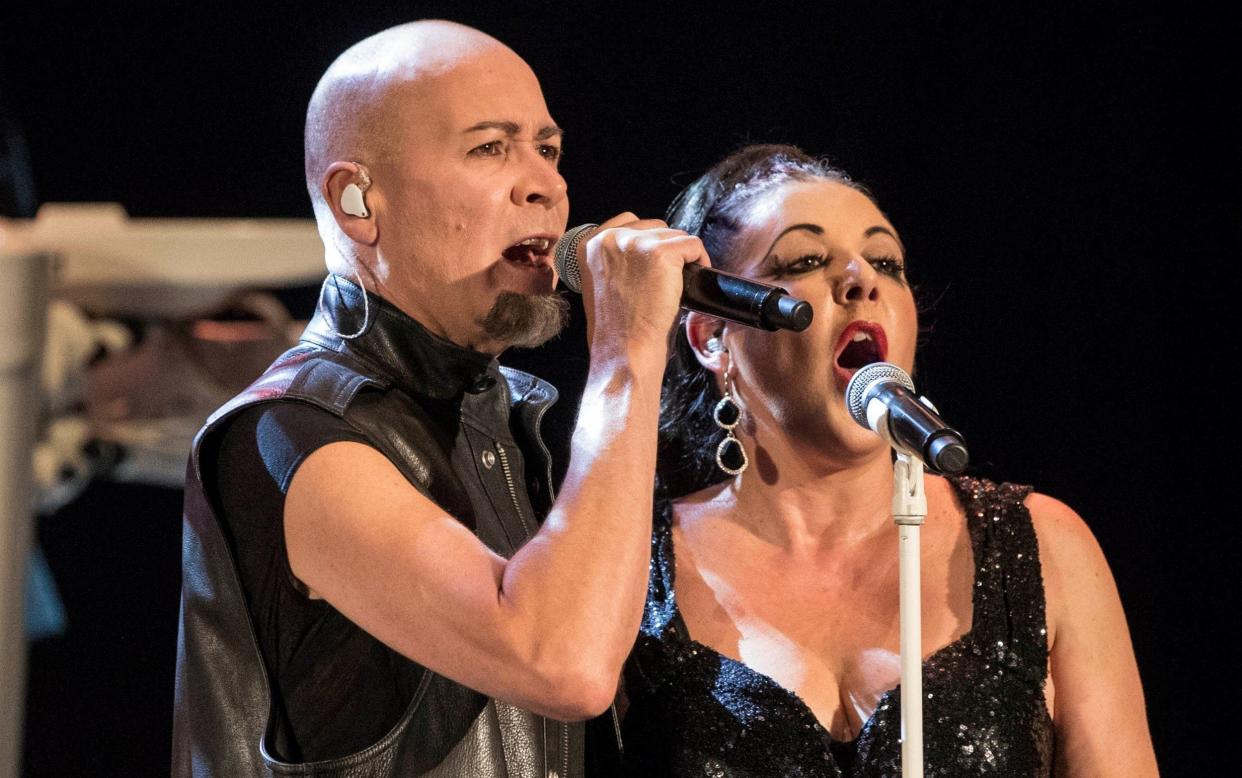The Human League, review: the things that pop dreams are made of

Forty years since their breakout third album, Dare!, the Human League sound like the world has just about caught up with them. In the night outside the refurbished SSE Wembley Arena, the parade of cubist buildings, geometric LED Christmas lights and moving picture hoardings of Wembley Way could have been a set from an Eighties sci-fi video. The effect was compounded by people wearing strange face coverings and flashing hand-held devices featuring NHS barcodes to gain entry to the floodlit arena. Why, you’d almost think there was some kind of global pandemic going on. Welcome to the future.
Inside the cavernous space, around 12,000 original Eighties synth pop fans stood soaking up a fizzing blizzard of electronic sound and bellowed at the top of their voices, “These are the things … these are the things … the things that dreams are made of!” A front-projected lightshow bounced off the bald pates of men in the audience, while middle-aged women executed shuffling dance moves in tightly packed rows of seats. Here were yesterday’s futurists today, and it was genuinely a sight to warm the most frozen heart.
“I’m not going to cry,” insisted backing singer Susan Anne Sulley. “I’ve cried every night on this tour.” Sure enough there was a crack in her voice as she thanked the audience for coming out to support them under such embattled circumstances. “I was a 17-year-old girl in a disco in Sheffield when this all began, now I’m a 58-year-old woman and you’re still here.” Such things, indeed, are pop dreams made of.
When David Bowie saw the original line up of the Human League in 1978, he is said to have declared “I have seen the future of pop music.” In 1980, the NME seemed equally dazzled by their post-rock productions, proclaiming, “One day all music will be made like this.” And, indeed, it mostly is, pop stripped to the bare bones of metronomic drum patterns, thick electronic bass and lean hook lines woven from synthetic soundwaves. But it is the songs themselves that carry all that technological production aloft.
If you want to hear the Human League play any album. it is surely Dare!, on which deep-voiced singer Phil Oakey split from his original band mates, recruited two schoolgirls he spotted in the aforementioned Sheffield disco, and crafted a set of songs that connected the startling sonic architecture of Seventies experimental new wave electronic music with melodic, groove-packed pop aspiring to the giddy heights of Abba. Dare! was the album where the 80s really began, and it still sounds the business.
With three suit-wearing backing musicians playing electronic drums, synths and keytars, the trio of singers bellowed and trilled through a propulsive, singalong set. Oakey’s trademark lopsided fringe is long gone, and these days the 66-year-old is as bald as much of his audience, but his rich baritone voice remains resonant and commanding, whether driving through stentorian mood pieces such as I Am the Law and Seconds, or stomping across the thrilling synth hooks of Love Action and The Sound of the Crowd.
Those two now-grown-up band mates still can’t sing with any real quality, and still dance like they are back in that high-street nightclub. But Sulley and her colleague Joanne Catherall put the Human in the League, retaining the amateurish energy that so charmingly personalised the colder and more abstract aspects of the band’s electro music.
The set ends, as did the album, in absolute pop perfection, with the Human League’s cinematic classic of love and rejection, Don’t You Want Me. If there was an odd insecurity in the way Oakey continually thanked the audience for turning up to see them four decades past their glory days, under very trying conditions, then it was warmly answered by the sheer volume of the singalong that shook Wembley Arena.
It’s OK, Phil. We still want you, baby.
Touring until Dec 18. Tickets and details: thehumanleague.co.uk